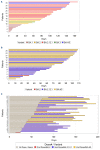Predictors of SARS-CoV-2 Omicron breakthrough infection after receipt of AZD7442 (tixagevimab-cilgavimab) for pre-exposure prophylaxis among hematologic malignancy patients
- PMID: 37345467
- PMCID: PMC10620572
- DOI: 10.3324/haematol.2023.283015
Predictors of SARS-CoV-2 Omicron breakthrough infection after receipt of AZD7442 (tixagevimab-cilgavimab) for pre-exposure prophylaxis among hematologic malignancy patients
Abstract
AZD7442 (tixagevimab-cilgavimab) is a combination of two human monoclonal antibodies for pre-exposure prophylaxis of severe acute respiratory syndrome coronavirus 2 (SARS-CoV-2) infection among high-risk patients who do not mount a reliable vaccine response. Foremost among these are hematologic malignancy patients with limited clinical trial or realworld experience to assess the effectiveness of this combination treatment since the emergence of Omicron and its subvariants. We performed a retrospective study of 892 high-risk hematologic malignancy patients who received AZD7442 at Memorial Sloan Kettering Cancer Center in New York City from January 1, 2022 to July 31, 2022. We evaluated demographic, clinical, and laboratory characteristics and performed regression analyses to evaluate risk factors for breakthrough infection. We also evaluated the impact of updated AZD7442 dosing regimens on the risk of breakthrough infection. Among 892 patients, 98 (10.9%) had a breakthrough infection during the study period. A majority received early outpatient treatment (82%) and eventually eight (8.2%) required hospitalization for management of Coronavirus Disease 2019 (COVID-19), with a single instance of severe COVID-19 and death. Patients who received a repeat dose or a higher firsttime dose of AZD7442 had a lower incidence of breakthrough infection. Univariate analyses did not reveal any significant predictors of breakthrough infection. While AZD7442 is effective at reducing SARS-CoV-2 breakthrough infection in patients with hematologic malignancies, no risk factors reliably predicted risk of infection. Patients who received updated dosing regimens as per Food and Drug Administration guidelines had better protection against breakthrough infection.
Figures

References
-
- Fendler A, Shepherd STC, Au L, et al. . Adaptive immunity and neutralizing antibodies against SARS-CoV-2 variants of concern following vaccination in patients with cancer: the CAPTURE study. Nat Cancer. 2021;2(12):1305-1320. - PubMed
MeSH terms
Substances
Supplementary concepts
Grants and funding
LinkOut - more resources
Full Text Sources
Medical
Miscellaneous

